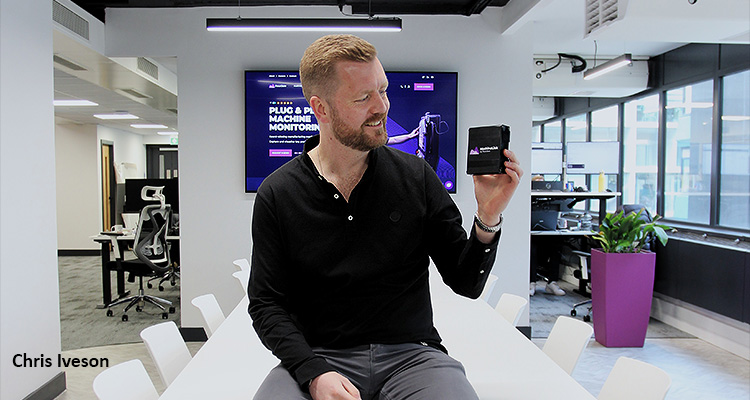
Chris Iveson says pragmatism is driving smart factory progress
The shift towards smarter factories is undeniable, with manufacturers embracing digital tools at an increasingly impressive rate.
Manufacturing economies such as Germany, Japan, South Korea, and the United States are recognized as leading the way in adopting smart factory technology. At the same time, research shows that UK manufacturers are digitizing faster than any other part of the economy. The adoption of artificial intelligence (AI), automation, data analytics and cloud computing has soared since 2020, with even the most cautious manufacturers now embracing these new tools and working methods.
World Bank data shows that manufacturers in these countries create four times more value per worker than those in other major manufacturing economies.
While the smart factory concept has been around for years, recent events have accelerated its implementation. Manufacturers are turning to technology to stay competitive, overcome skilled labor shortages and manage the cost pressures associated with inflation, tariffs and escalating energy costs. 
Covid-19, in particular, highlighted the need for greater automation and data-driven decision-making. The ‘adapt or die’ post-pandemic reality has pushed manufacturers to rapidly adopt technologies like automation, data analytics and AI.
These pressures demand a more agile and responsive approach to manufacturing, a strategy that technology can facilitate.
Another factor advancing smart factories at pace is the cloud, which is now the default for new manufacturing technologies and the dominant form of computing for manufacturing companies. Powerful tools – often proven by large corporations and tech-savvy innovators seeking a competitive edge – are now accessible and affordable for most manufacturers as software-as-a-service applications.
For those looking to advance their smart factory initiatives, three key areas deserve attention:
Improving productivity with data analytics and AI
Data gathered from machines and sensors on the factory floor is abundant in manufacturing. However, it is only valuable when translated into actionable insights.
Analytics that show patterns, trends, and effects more clearly, such as the true causes of the most disruptive downtime, allow managers and their colleagues to identify opportunities for interventions and continuous improvement.
We’ve seen manufacturers optimize the use of their resources by up to 30 percent using these tools, which provides significant room for maneuver when dealing with rising costs from tariffs and other sources.
Generative AI tools are making it possible to analyze large datasets and identify patterns humans might miss. This technology provides ‘big data’ capabilities to manufacturers without dedicated data teams, allowing anyone gathering data from their assets to optimize processes, predict maintenance needs and improve efficiency.
Supporting workers with technology
The shortage of skilled labor is a significant challenge for manufacturers. Many are struggling to find skilled workers because experienced employees are retiring, and younger people aren’t filling those roles at the same rate.
So, manufacturers are investing in technologies that enable their existing workforce to do more. This is particularly true in the UK, where research suggests around 90 percent of manufacturers are already using some form of automation. The average value added by factory workers in the UK increased more than in any other major manufacturing economy between 2018 and 2023.
Manufacturers are turning to automation, robots and cobots that can handle repetitive or physically demanding tasks, enabling workers to do much more or freeing them up entirely to focus on more complex and strategic activities.
 They are also using smart devices to improve communication and collaboration within the factory. Empowering shop-floor staff to make the right real-time decisions, without having to leave the factory floor, saves huge amounts of time wasted walking, talking and waiting for managers.
They are also using smart devices to improve communication and collaboration within the factory. Empowering shop-floor staff to make the right real-time decisions, without having to leave the factory floor, saves huge amounts of time wasted walking, talking and waiting for managers.
Using technology to support sustainability
Sustainability, which has grown in importance for reputational and cost-efficiency reasons, is now a regulatory requirement. New regulations, such as the Carbon Border Adjustment Mechanism, which affects manufacturers trading with or within the European Union, now require manufacturers to achieve a detailed understanding of the energy consumption associated with each production process.
Smart factory technologies can play a significant role in understanding and improving performance here. Manufacturers are increasingly using these tools to monitor energy usage, ensure accurate carbon emission reporting, and identify areas for improvement.
The pragmatic path to the smart factory
The smart factory movement is advancing, driven by competitive, cost and sustainability pressures, and more accessible and affordable technologies. Research institutions are producing increasingly innovative solutions, delivered through the cloud and cost-effective software-as-a-service subscriptions.
But the smart factory is not about technology for technology’s sake. It’s about using practical, proven solutions to tackle the most important operational challenges, identify the main causes of downtime, improve planning and decision-making on the shop floor, enhance sustainability, and inform continuous improvement activities that drive efficiency, improve productivity, and reduce costs.
With this pragmatic approach, focused on addressing clearly defined problems and opportunities for improvement, smart manufacturers are navigating the challenges of today and building a more resilient, productive and competitive future.
Chris Iveson
Chris Iveson is CEO of FourJaw Manufacturing Analytics. Founded in 2020 as a spinout from the University of Sheffield’s Advanced Manufacturing Research Centre, FourJaw is a UK-based SaaS company empowering manufacturers of all sizes to enhance productivity, reduce energy usage and grow more profitably. FourJaw’s plug-and-play machine monitoring platform integrates seamlessly with machines of any age or brand. It is trusted by over 140 manufacturers globally operating in various subsectors, including aerospace, automotive, energy and food production.